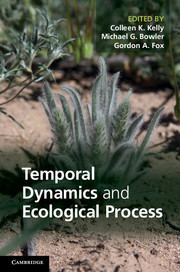Book contents
- Frontmatter
- Contents
- List of Contributors
- 1 Introduction
- Part I Observing temporal processes in nature
- Part II Application to specific questions
- 9 Evolution of synchronised and intermittent reproduction (masting) of trees: key role of regeneration dynamics
- 10 Spatiotemporal variation can promote coexistence more strongly than temporal variation
- 11 Roles of pollinator attraction and environmental fluctuation in inducing flowering synchrony
- 12 Temporal dynamics and the spread of insect resistance transgenes
- 13 Concluding remarks
- Index
- References
9 - Evolution of synchronised and intermittent reproduction (masting) of trees: key role of regeneration dynamics
Published online by Cambridge University Press: 18 December 2013
- Frontmatter
- Contents
- List of Contributors
- 1 Introduction
- Part I Observing temporal processes in nature
- Part II Application to specific questions
- 9 Evolution of synchronised and intermittent reproduction (masting) of trees: key role of regeneration dynamics
- 10 Spatiotemporal variation can promote coexistence more strongly than temporal variation
- 11 Roles of pollinator attraction and environmental fluctuation in inducing flowering synchrony
- 12 Temporal dynamics and the spread of insect resistance transgenes
- 13 Concluding remarks
- Index
- References
Summary
Introduction
The variable and synchronous production of seeds by plant populations is called masting or mast seeding and is observed in diverse forests (Kelly 1994). Many flowers and fruits are produced one year (called a mast year) but little reproductive activity occurs during the several subsequent years until the next mast year (Herrera et al. 1998, Koening and Knops 1998, 2000, Koening et al. 1999). The variance in the reproductive activity of trees between years is large. It cannot be simply a result of environmental fluctuation in annual productivity (Tamura and Hiura 1998).
Many studies on masting have focused on adaptive significance (Kelly and Sork 2002). A popular hypothesis is the predator satiation theory – that is, seed predators starve during non-mast years, while they are unable to consume all the seeds during mast years (Janzen 1971, Silvertown 1980, Nilsson and Wästljung 1987, van Schaik et al. 1993). An alternative but not mutually exclusive hypothesis is pollination efficiency: in mast years, trees receive a lot of outcross pollen, which may improve fruiting success compared with reproduction in non-mast years (Nilsson and Wästljung 1987, Smith et al. 1990, van Schaik et al. 1993, Shibata et al. 1998, Kelly et al. 2001, Rees et al. 2002, Satake and Bjørnstad 2004).
Information
- Type
- Chapter
- Information
- Temporal Dynamics and Ecological Process , pp. 191 - 223Publisher: Cambridge University PressPrint publication year: 2014
